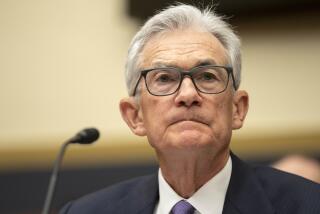Bernanke says unemployment hasn’t improved enough to slow stimulus
WASHINGTON -- Despite improvement in the labor market over the last year, central bank policymakers were not confident enough yet that the economy could handle a reduction in a key stimulus program to move ahead with a pullback this month, Federal Reserve Chairman Ben S. Bernanke said Wednesday.
“Conditions in the job market today still are far from what all of us would like to see,” Bernanke said at a news conference after the policy-setting Federal Open Market Committee voted to continue its bond-buying program at the same pace.
The unemployment rate has dropped from 8.1% when the stimulus program began a year ago to 7.3% last month, Bernanke said.
The figure is close to the 7% level Bernanke has said the Fed wanted to see at the end of the bond-buying program.
But he noted that the rate still is “well above acceptable levels.”
In addition, the percentage of Americans in the labor force has dropped by about 0.3 percentage points and real wages have not grown, he said.
QUIZ: How well do you understand the Fed stimulus?
“The unemployment rate is not necessarily a great measure in all circumstances of the state of the labor market overall,” Bernanke said. “There is no magic number we are shooting for. We are looking for overall improvement in the labor market.”
Bernanke’s comments came after Fed policymakers stunned most economists by voting to keep its bond-buying stimulus program unchanged.
Financial markets had expected the Fed to announce it would begin tapering its monthly $85 billion in bond purchases by about $15 billion a month.
“We can’t let market expectations dictate our policy actions,” Bernanke said. “Our policy actions have to be determined by our best assessment of what’s needed for the economy.”
Fed officials want to wait to see more economic data to be confident a reduction in the bond-buying is the right move, he said.
Policymakers could take the first-step in reducing the bond-buying “possibly later this year.” That was a pullback from Bernanke’s comments in the spring that he anticipated a reduction would come this year.
“We are tied to the data,” Bernanke said. “We don’t have a fixed calendar schedule.”
Bernanke also said that recent tightening in financial markets, such as rising mortgage rates, was a threat to economic growth.
Interest rates have risen sharply since the spring because Bernanke and the Fed indicated they were preparing to reduce the monthly bond purchases, which were designed to push down long-term rates.
ALSO:
U.S. poverty rate holds steady near a generational high
Forget too big to fail: Some banks now too small to succeed
Access to healthcare for the poor varies widely among states







